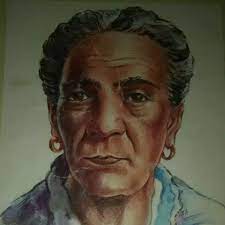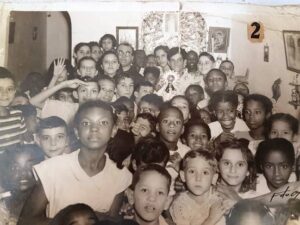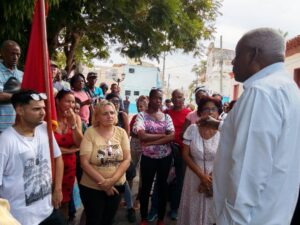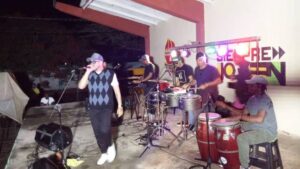Mariana Grajales


They call her «The Mother of the Maceos», «The Mother of all Cubans», «The Mother of the Homeland» and Martí called her «Mariana Maceo», surname of brave, courageous men, inscribed forever in history; but Mariana Grajales Cuello shines with her own light.
When she came into the world, the date of the abolition of slavery in Cuba was far away, but she was born free, because her parents, Teresa Cuello Zayas and José Grajales Matos, mulattoes, were free, and they had not even suffered that scourge.
To the formation of her character contributed the work in the fields of the farm owned by her father, near the city where the family lived. As she grew up, she became a strong woman, with inflexible principles, a tireless worker and a natural, lively and agile intelligence.
At a very young age, on March 21st, 1831, she married a free mestizo, Fructuoso Regüeiferos Echavarría, with whom she had her first four children.
Regüeiferos died on July 5th, 1840. Widowed, alone and poor, she had to return to her parents’ house, three years later she met Marcos Maceo and married him on July 6th, 1851. From their love arose a large family, raised in respect for parental authority, work and dedication to the freedom of the homeland, and their destinies were united until the day he died in her arms, in September 1869, in the manigua, after being wounded in combat against the Spanish army.
The injustices imposed by Spain, the contempt for her race and the cruelty in the treatment of the slaves, provoked in her a feeling of rebellion that grew as she learned about the conspiratorial movements against the colonialist oppressors of her country through a select group of friends who visited her home.
The story records the words of Mariana when on October 12th when faced with the request of an insurrectionist as to which of the sons would give him for the contest, Marcos is silent, she goes to a room, takes a crucifix, returns and says:
«On our knees all, fathers and sons, before Christ, who was the first liberal man who came into the world, let us vow to liberate the fatherland or die for it.» What an example of love of neighbor! Someone who knew her at the time of the war described her as follows in an article in the Bohemia magazine of December 10th, 1944: «(…) she was over fifty-five, robust, of regular height, rather short, nervous, with light movements, resolute in such a way that contrasted with the character of her husband…».
Not a minute of weakness was there in her ten years of insurrection, living in caves and other places similar to those of the maroons when they fled from the stocks and death, crossing rivers, climbing mountains, under the rain or the burning sun of the easternmost part of the island…».
In the face of every misfortune, his strength of spirit prevailed, as when he saw Antonio in very bad condition, with a hole in his chest, he told his son Marcos, who was not yet 14 years old: «And you, get on your feet, because it is time for you to go to camp».
There is another version: «And you, boy, get on your feet, it is time for you to fight for your country». One or the other, or however the expression was said, it puts very high the honor and patriotic courage of this exceptional Cuban.
She was supportive, healing both the wounded of the Mambi Army and the Spanish. Mariana suffered a lot during that decade in the Mambo rearguard. There she faced the death in combat of her sons Fermín, Miguel, Julio and the shooting of Justo, the death of her husband, who embraced the cause for independence and fought under the orders of her son Antonio, next to José, both wounded on several occasions, as well as Felipe, Marcos, Rafael and José Tomás.
Mariana’s historical dimension is present in all the beautiful pages written by Cuban women of all times and especially in the last fifty years.
Written by Alejandro López Quintero.




